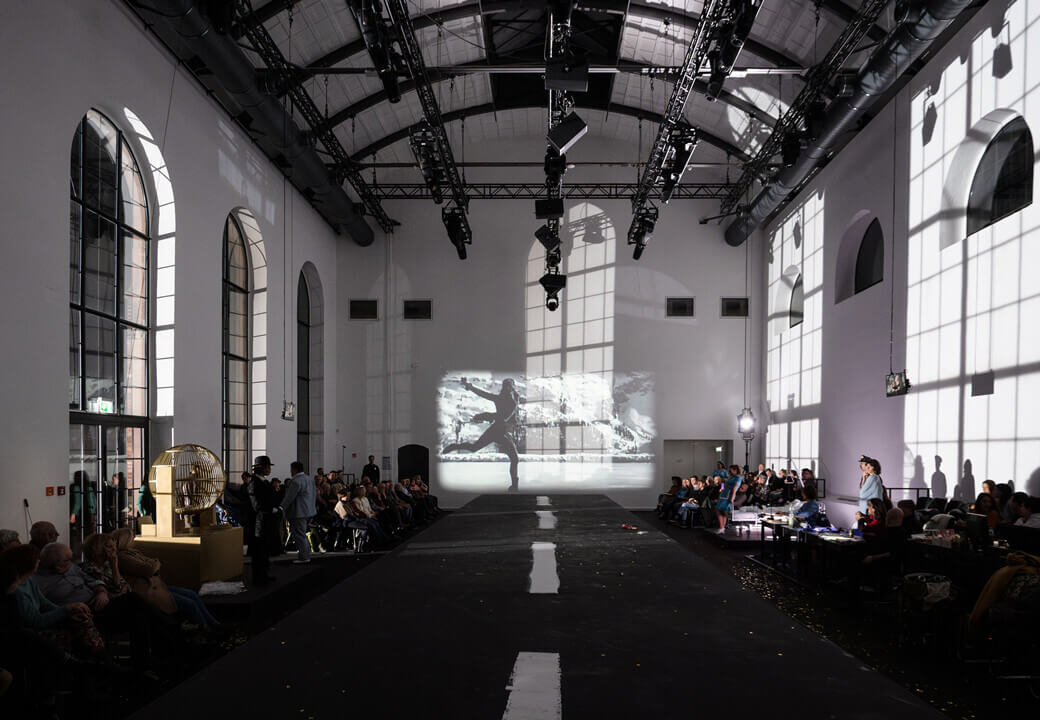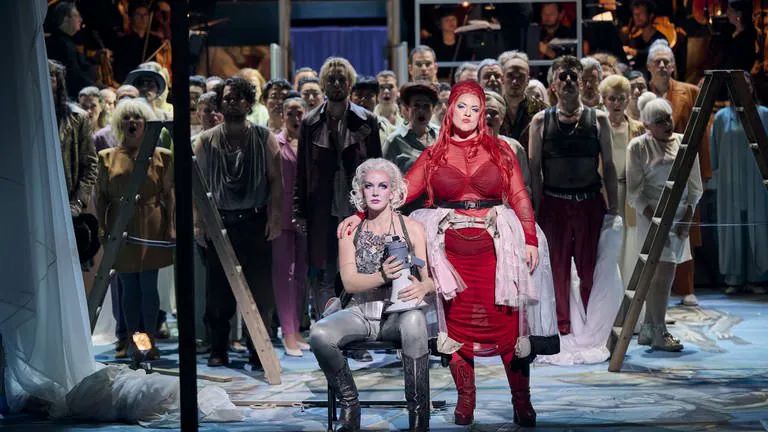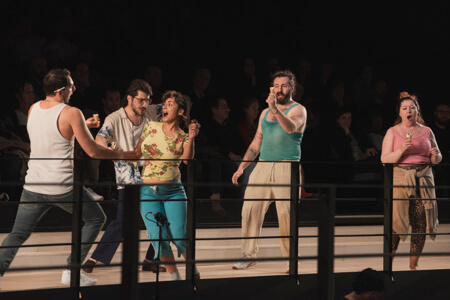
Der Silbersee in Mannheim:
A Timeless Work Plays in a Unique Space
|
A scene from Der Silbersee at the Alte Schildkrötfabrik in Mannheim. Photo: Christian Kleiner. |
By no means does music theater require a traditional auditorium to come to life. A new production of Der Silbersee by Nationaltheater Mannheim proves this point once again. When the doll manufacturer Schildkröt moved from Mannheim to Thuringia in 1993, it left behind a complex of factory buildings in need of a new purpose. The long narrow structure that previously held boiler works was converted into a space for theater. Director Calixto Bieito and scenic designer Anna-Sofia Kirsch have taken the opportunity afforded by the building’s unusual dimensions to envision Weill’s 1933 opera-play hybrid in a fresh configuration, with the action taking place in close-up proximity to the audience. In contrast to productions that emphasize the work’s origin at the moment when National Socialists seized power in Germany, Bieito’s staging plays down this temporal specificity. Featured on the Südwestrundfunk Kultur program, the director commented: “Ultimately, it is a timeless piece because the social problems it deals with are still with us. I did not want to make a direct connection to our current situation with major social and economic problems, but of course there are connections.” Writing in the Mannheimer Morgen, reviewer Stefan Dettlinger enthused that with this production of Der Silbersee, “the opera at the Nationaltheater Mannheim has landed a full-fledged hit.” Dettlinger singled out music director Jürgen Goriup and the musicians of the orchestra for their skillful shifting “between spoken and musical theater, between more serious and entertaining music.” The production will continue until 6 January. |
Indispensable Study of Weill’s Work |
|
At the time of its publication in 2012, Weill’s Musical Theater: Stages of Reform by Stephen Hinton was hailed as a magisterial creation. Kim H. Kowalke, President and CEO of the Kurt Weill Foundation, described it as an “astonishing achievement,” adding that “this book, the first scholarly examination of Weill’s complete stage work, is undoubtedly the most important critical study of the composer’s oeuvre.” Suhrkamp Verlag has now published this crucial work in German, translated by Veit Friemert. Hinton, the Avalon Foundation Professor of Humanities at Stanford University, has incorporated into Kurt Weills Musiktheater: Vom Songspiel zur American Opera additional material not present in the original edition. As a whole, this new publication brings Hinton’s fresh perspective and unique insights to readers in the country of the composer’s birth. It is required reading for those seeking a full picture of the work of Kurt Weill, an artist of high aspiration who lived in complex and volatile times. |
Continuing Acclaim for Tom Sawyer |
|
Tom Sawyer (Tom Schimon) at the infamous fence. Photo: Werner Kmetitsch. |
In February of this year, Komische Oper Berlin created a buzz when it launched Tom Sawyer. Billed as a Kinderoper (children’s opera), the work was the culmination of years of engagement by librettist John von Düffel with the subject of Weill’s last, unfinished theater work, Huckleberry Finn. Around the five fully drafted songs from that projected piece, von Düffel, arranger Kai Tietje, and the Komische Oper team built a new version of Mark Twain’s classic about friendship, family, wild adventures, and first love. A number of additional songs by Weill were incorporated, some with new lyrics. Premiered to unanimous critical acclaim in Berlin, Tom Sawyer’s first production in Austria, by Oper Graz, has again earned enthusiastic plaudits. “A triumphant premiere!” asserts Christoph Hartner in the Kronen Zeitung. Elisabeth Willgruber-Spitz in Kleine Zeitung calls it “a showcase project that thrilled at the Austrian premiere.” Tom Schimon, a Lenya Competition award winner, portrays the title character “not only with great vocal presence but also with infectious enthusiasm.” The production will play a total of 29 performances through June 2024. |
Guy Stern: Eminent Scholar and |
|
As Lotte Lenya thoughtfully prepared for the continuation of the Kurt Weill Foundation after her death, she invited onto its Board of Trustees a number of people who would play decisive roles in the advancement of Weill’s legacy in the years to come. Few would prove more central to the cause than Guy Stern, who passed away in December at the age of 101. An eminent scholar of German literature, Stern joined the Board in 1979 and was instrumental in the Foundation’s governance over the ensuing decades, serving as an officer virtually the entire time. In addition to his unwavering commitment to Weill’s music and to Lenya’s artistic legacy, he brought deep knowledge, human insight, and an always present gentle humor. He will be missed by all of his colleagues at the Foundation, trustees and staff alike. See the KWF’s tribute to Guy Stern on the occasion of his hundredth birthday. |
|
|
|
|
|
|







